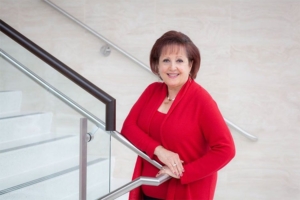Guest Column: Collaboration is the way to move forward
When I served in Congress, I was dedicated to representing my southern Minnesota district. I was not there to simply vote the party line; I did my best to take into consideration the differing political ideologies that existed at the time among my constituents. As a legislator, I made it a priority to develop partnerships with other legislators — in both parties — to find common ground and to influence legislation to the benefit of the communities I served.
As divisions in our country and state have become amplified in recent years, I believe it is important to emphasize that collaboration is central to how we will be able to move forward. Here at Southern Minnesota Initiative Foundation, collaboration is a key value and a guiding force in how we do our work.
SMIF’s vision is that southern Minnesota will be a prosperous and growing region with vibrant communities, innovative and successful economies and engaged and valued citizens. As we celebrate SMIF’s 35th anniversary this year, and more than $121 million invested in our 20-county region during that time, we know that we would not have been able to make progress on this vision without the many partners that have supported our efforts over the past three and a half decades.
Partnerships have made it possible for SMIF to award 4,300 grants since our inception. For example, we work with Ace Hardware and Arrow Hardware & Paint, to distribute paint to communities for projects like murals through our Paint the Town Grants. We partner with publishers ABDO and Capstone to distribute thousands of books to children birth through age 5 through our Early Literacy Grants (and many more thousands of books get distributed through our early childhood programming). We recently partnered with Region Nine Development Commission and SE MN Together to launch a special Inclusive and Equitable Communities Grant program, awarding $160,000 to organizations that are increasing equity and inclusion within communities and supporting entrepreneurs of diverse backgrounds.
Since 1986 we have been able to support more than 700 businesses through our lending program because of our partnerships with financial institutions and economic development agencies. We have also partnered with our 30 Community Foundations by providing $823,000 in matching grants over the years, offering direct support to their communities.
Our commitment to collaboration made it possible for us to distribute $12.1 million in COVID-19 response dollars. SMIF partnered with the state of Minnesota throughout 2020 to distribute grants and loans to support children, child care providers, entrepreneurs and communities in our region during this crisis. Most recently we partnered with the Minnesota Department of Employment and Economic Development (DEED) to distribute $10.2 million in Small Business Relief Grants, helping keep more than 1,000 southern Minnesota businesses afloat. We also worked with the Minnesota Department of Education (MDE) to award $180,000 in Early Care and Wrap Around Grants to fund early care and education wrap around services for children birth to age eight from underserved populations impacted by the pandemic.
It is impossible to name every partner that has made a difference in SMIF’s work, but we are appreciative of each and every one of them. Without this culture of collaboration, we would have a vision for our region’s prosperity without the means to execute that vision. Likewise, Minnesota — and our country — will make progress when we all work together.
As always, I welcome your comments and questions. You can reach me at timp@smifoundation.org or 507-455-3215.
Tim Penny is the president and CEO of Southern Minnesota Initiative Foundation. He represented Minnesota’s 1st Congressional District in the U.S. House of Representatives from 1982 to 1994.
View article.


 “Coming to the United States as an immigrant and establishing a small business shows how we are the heartbeat of this country. I believe in uplifting small businesses because of that personal connection that people get in the hospitality industry—we are the heart of our community.” —Mayor Najwa Massad
“Coming to the United States as an immigrant and establishing a small business shows how we are the heartbeat of this country. I believe in uplifting small businesses because of that personal connection that people get in the hospitality industry—we are the heart of our community.” —Mayor Najwa Massad  A popular restaurant in St. James, MN is the China Restaurant or better known as China Dave’s by the locals. At the restaurant you will often be met by David Ouyang, the owner of China Restaurant since 1994. David came to the United States from Taiwan when he was 26 years old. He and his wife first decided to open up the China restaurant after he worked in Fairmont for a few years. He chose St. James to build a business because there was opportunity there for someone with less experience. In Mankato, where he lives, you often need education in business or experience in order to have a successful restaurant. He started the restaurant to give his five children an education and feels grateful for the opportunities that he and his children have. All five of them have been very successful and have all gone on to get a degree from a university. When opening a business in a rural city, David felt welcomed by the community and has felt like St. James has become part of his family. He has been able to watch children in the community grow up which he says is one of his favorite parts about the community. Although he felt at times it can be isolating in a rural community being only a few people of Asian descent in the area, he feels grateful for the support and for the future of his family. For other new business owners, he thinks that there needs to be more financial support and opportunities and thinks that people within the community can help new business owners succeed.
A popular restaurant in St. James, MN is the China Restaurant or better known as China Dave’s by the locals. At the restaurant you will often be met by David Ouyang, the owner of China Restaurant since 1994. David came to the United States from Taiwan when he was 26 years old. He and his wife first decided to open up the China restaurant after he worked in Fairmont for a few years. He chose St. James to build a business because there was opportunity there for someone with less experience. In Mankato, where he lives, you often need education in business or experience in order to have a successful restaurant. He started the restaurant to give his five children an education and feels grateful for the opportunities that he and his children have. All five of them have been very successful and have all gone on to get a degree from a university. When opening a business in a rural city, David felt welcomed by the community and has felt like St. James has become part of his family. He has been able to watch children in the community grow up which he says is one of his favorite parts about the community. Although he felt at times it can be isolating in a rural community being only a few people of Asian descent in the area, he feels grateful for the support and for the future of his family. For other new business owners, he thinks that there needs to be more financial support and opportunities and thinks that people within the community can help new business owners succeed.